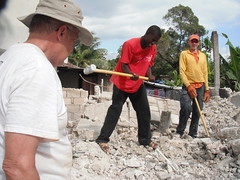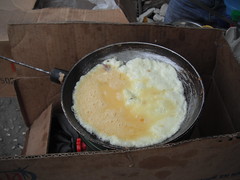Recycling Haiti's Earthquake Rubble Into Safe, Strong Concrete:
"The Haitian-made concrete had an average compressive strength of 1,300 pounds per square inch,' says Kimberly Kurtis, a Georgia Tech professor and chair of the American Concrete Institute's Materials Science of Concrete Committee.
'In comparison, concrete produced in the U.S. would be expected to have a minimum strength of 3,000 pounds per square inch,' said Kurtis.
For a second round of tests, the researchers manually crushed rubble samples with a hammer to provide coarse aggregate, used sands collected in Haiti and mixed the batches by hand. But this time, instead of estimating the amounts of materials they measured volumes using methods prescribed by the American Concrete Institute.
This time the blocks showed an average strength of more than 3,000 pounds per square inch.
'Based upon these results, we now believe that Haitian concrete debris, even of inferior quality, can be effectively used as recycled coarse aggregate in new construction,' said Kurtis. '






